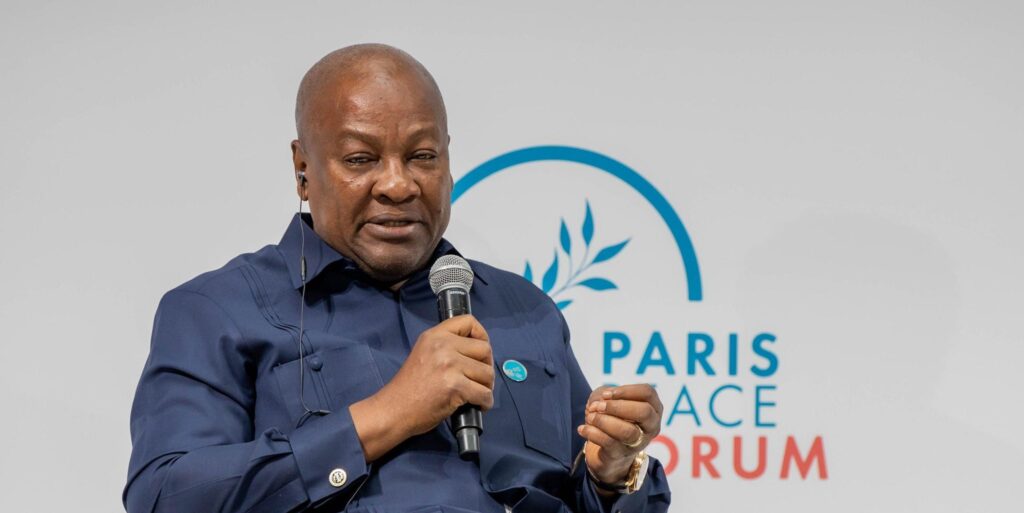Listen to the article
In a powerful address to the 8th Paris Peace Forum, Ghanaian President John Dramani Mahama called on world leaders to unite against the growing threats of misinformation and disinformation, describing them as existential challenges to democracy and sustainable development.
Speaking to the assembled dignitaries on October 29, 2025, Mahama emphasized the urgent need for coordinated global action. “Together, we must work to win the global war against misinformation and disinformation,” he declared. “We leave this conference reminded that disinformation is not an abstract issue. It is shaping elections, distorting public health responses, fueling conflicts, and undermining the fight against climate change.”
The Ghanaian leader highlighted how false information continues to undermine public confidence in science and policy, even a decade after the landmark Paris Climate Accord. He drew a direct connection between information integrity and environmental progress, stating, “If we are to build a sustainable planet, we must also make an informed public.”
Mahama specifically addressed the double-edged nature of artificial intelligence technologies, acknowledging their innovative potential while warning of their capacity to amplify misinformation. “Deepfakes, synthetic media, and algorithmic manipulation are reshaping what our societies perceive to be the truth,” he cautioned. “Our collective task must therefore be to harness AI responsibly, to promote transparency, and to ensure that technological progress strengthens rather than undermines public trust.”
In a significant development, Mahama announced that Ghana would become the first African nation to make a financial contribution to global efforts against disinformation. This move positions Ghana as a continental leader in the fight for information integrity and demonstrates the country’s commitment to addressing what many observers consider the defining challenge of the digital age.
“Ghana will take the lead in Africa by making a financial contribution to global efforts against disinformation,” Mahama stated. “This is our pledge to support a world where facts, not falsehoods, guide decision-making and public trust.”
The president’s announcement comes at a critical time for Africa, where many nations are grappling with the destabilizing effects of misinformation, particularly during election periods and public health crises. Ghana’s commitment may encourage other African countries to prioritize similar initiatives as the continent continues its rapid digital transformation.
Mahama also emphasized the essential role of journalism in preserving democratic values, describing independent reporting as “a public good” vital to societal well-being. “When journalists can hold their governments accountable, societies flourish. When truth is defended, peace is preserved. And when citizens can access reliable information, democracy endures,” he said.
His remarks on journalism resonated with many media advocates present at the forum, who have been raising alarms about declining press freedoms and the economic challenges facing news organizations worldwide. The president’s framing of truth as an investment comparable to infrastructure or defense represents a notable shift in how information integrity is conceptualized in policy discussions.
“The world must invest in truth as deliberately as it invests in infrastructure, in energy or defense,” Mahama argued. “The cost of inaction will be far greater than the cost of those commitments.”
The Paris Peace Forum, established in 2018, has evolved into a key platform for multilateral dialogue on global challenges. This year’s theme, “Building Trust, Restoring Truth: Collective Action for a Safer and Fairer World,” brought together leaders and stakeholders focused on collaborative approaches to peace, governance, climate action, and digital transformation.
Mahama’s address underscored the interconnected nature of these issues with the fight against misinformation, reflecting a growing consensus among international leaders that information integrity is foundational to addressing virtually all other global challenges.
As disinformation continues to shape electoral outcomes and public discourse worldwide, Mahama’s call to action highlights the urgency of developing both technological and policy solutions to safeguard the information ecosystem that underpins democratic societies.
Verify This Yourself
Use these professional tools to fact-check and investigate claims independently
Reverse Image Search
Check if this image has been used elsewhere or in different contexts
Ask Our AI About This Claim
Get instant answers with web-powered AI analysis
Related Fact-Checks
See what other fact-checkers have said about similar claims
Want More Verification Tools?
Access our full suite of professional disinformation monitoring and investigation tools




10 Comments
Misinformation and disinformation are indeed major global challenges that undermine democratic discourse and policy progress. President Mahama is right to call for coordinated action to address this threat to sustainability and the public good.
Agreed. Restoring public trust in reliable information sources and fact-based decision-making is crucial, especially on vital issues like climate change.
The President’s emphasis on the connection between information integrity and environmental progress is an insightful perspective. Tackling disinformation is essential for mobilizing the public support needed for sustainable development.
Absolutely. Restoring public confidence in science and fact-based policymaking is a critical step in addressing global challenges like climate change.
The connection Mahama made between information integrity and environmental progress is an insightful one. Tackling the spread of false narratives will be key to mobilizing the informed public action needed to address complex global challenges.
Absolutely. Disinformation has the power to erode public understanding and undermine policy responses on critical issues like climate change. Concerted global efforts to combat this are sorely needed.
Mahama’s speech highlights the far-reaching impacts of misinformation, from distorting elections to undermining public health and climate action. His call for a global response is well-justified and timely.
Mahama’s call for world leaders to unite against misinformation and disinformation is a timely and necessary one. These are not just abstract issues, but real threats to democracy, public health, and sustainable development.
It’s good to see a leader like President Mahama recognizing the urgency of addressing misinformation, which has become a global scourge. Coordinated international action is crucial to counter this growing challenge.
Agreed. Restoring public trust in reliable information will be key to building the informed, engaged citizenry needed to tackle complex global problems like climate change.